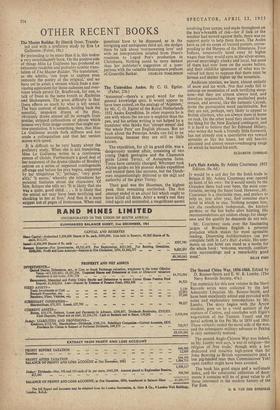OTHER RECENT BOOKS
The Master Builder. By Henrik Ihsen. Transla- ted and with a prefatory study by Eva Le Gallienne. (Faber, 18s.)
BY pretending to be more than it is, this makes a very unsatisfactory book. On the positive side of things Miss Le Gallienne has produced an extremely readable and probably actable trans- lation of The Master Builder. 'No translation,' as she admits, 'can hope to capture even remotely the poetry of the original,' and we have yet to await a version which finds a con- vincing equivalent for those cadences and over- tones which permit Dr. Bradbrook, for one, to talk of Ibsen in the same breath as fEschylus and Shakespeare. The great difficulty is that Ibsen effects so much by what is left unsaid. The bare contour of speech, holding back the essential, unspoken drama of the play, obviously draws almost all its strength from precise, stripped collocations of phrase which possess very little image-content that might sur- vive translation. It is something, then, that Miss Le Gallicnne avoids both stiffness and too crude a colloquialism and that her version moves with speed.
It is difficult to be very happy about the prefatory study. When she is not translating, Miss Le Gallicnne writes in a continuous stream of cliches. Furthermore a good deal of her treatment of the drama (shades of Bradley) centres on a series of supposed contingencies off-stage and before the play begins, supported by her ubiquitous 'if,' perhaps,"very prob- ably,' it seems,' whereby she introduces her personal fantasies about the characters. Of Mrs. Solness she tells us: 'It is likely that she was a quiet, good child. . . . It is likely that the sexual act may have been terrifying and shocking to her at first.' And that is a mere snippet out of pages of irrelevance. When real
questions have to be discussed, as in the intriguing and ambiguous third act, she dodges them by talk about 'overpowering love' and with an interpretation intuited from Ibsen's reactions to Lugne Poe's production in Christiania. Nothing could be more inexact than her publisher's suggestion of a com- parison with the valuable Shakespeare prefaces










































 Previous page
Previous page